Follow Your Different
349 October 7th Horror To Hope: A Tech Startup For Every Fallen Israeli with Izhar Shay & Ophir Shay, Next October Co-Founders
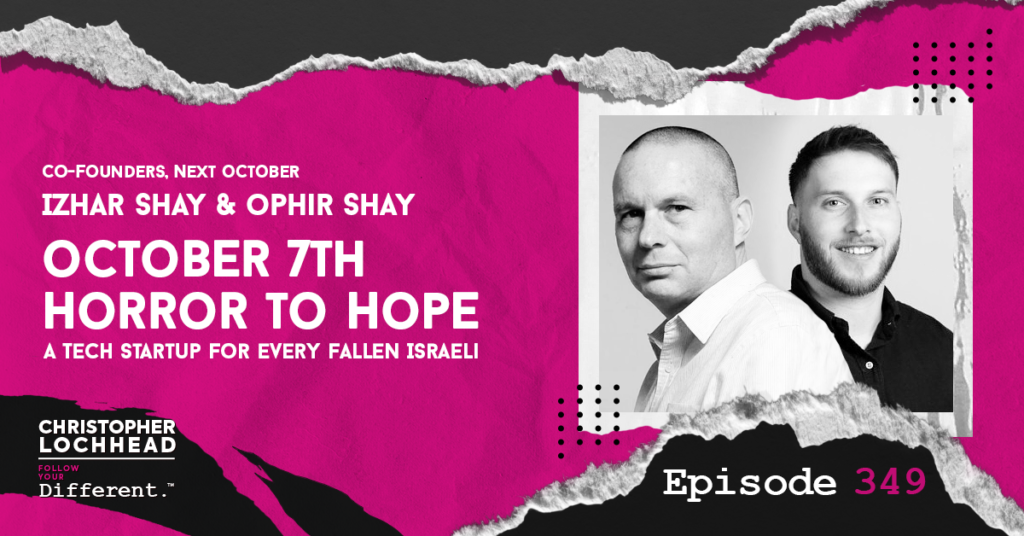
Podcast: Play in new window | Download (Duration: 1:29:04 — 61.2MB) | Embed
Subscribe: Apple Podcasts | Spotify | Pandora | RSS | More
On this episode of Christopher Lochhead: Follow Your Different, we are joined by Izhar and Ophir Shay, a father and brother to Israelis who have lost their lives in the Hamas attack. Today, they share how they chose to honor their fallen, in what can only be described as, Different.
Izhar Shay is an entrepreneur – a venture capitalist, very successful in the startup community and startup nation in Israel. And he’s a former Israeli Member of Parliament who served as the Minister of Science and Technology. His son, Ophir Shay, is also an entrepreneur, and he has a background in marketing and customer support. Both men have served honorably in the IDF.
In Israel, it is customary to plant a tree for fallen Israelis taken in war or terrorism. But Izhar and Ophir chose to honor them by starting a startup called Next October, a nonprofit on a mission to create and build a new successful Israeli startup for every person murdered or kidnapped on October 7. It’s an extraordinary vision. How you can take horror and turn it into hope and prosperity.
You’re listening to Christopher Lochhead: Follow Your Different. We are the real dialogue podcast for people with a different mind. So get your mind in a different place, and hey ho, let’s go.
Ophir Shay and Izhar Shay on Coping with Loss and Grief
When asked by Christopher on how they are doing, Ophir expresses optimism amidst difficulty, mentioning progress with connecting companies and families.
Izhar then reflects on the challenge of answering “how are you doing?” following a family tragedy on October 7, losing their youngest son, Yaron, a soldier. Christopher empathizes, sharing his experience of loss and the struggle with such questions.
Izhar details Yaron’s life, highlighting his values as both an Israeli and American citizen. Yaron is remembered as a remarkable individual, cherished by his family, and honored for his service.
Memories of Yaron and His Passions in Life
Izhar and Ophir continue the conversation about Yaron’s life, one that is filled with different passions, be it in music, watching and playing different sports, and tattoos.
Izhar further reflects on Yaron’s passion for sports, spanning across continents and connecting people. He highlights Yaron’s dedication to his favorite teams and how his commitment was recognized even in his funeral.
Christopher reciprocates, sharing his lifelong passion for sports, particularly football and hockey. He recounts a story about NBA Hall of Famer Bill Walton, emphasizing the joy of being an enthusiastic fan and celebrating one’s passions.
Both agree that sports serve as a unifying force, fostering connections and bonding within families and communities.
On accepting New and Old Communities
Continuing on that line of thought, Christopher shares his experiences of bonding with his nephews over football, and introducing them to different activities, and in effect, different communities. He notes that music and sports communities tend to be more accepting, as while options might differ vastly from person to person, it’s still an avenue to get a conversation started and to have something common to talk about even if it’s the first time you have met the other person.
Ophir agrees with this sentiment, and also adding that at the end of the day, it’s about embracing a new community, or even finally embracing one that you’ve been part of all along. Nothing is stopping anyone from being hardcore fans of their teams, as long as they show mutual respect for others and the teams they support. And isn’t that the point of it all in the end?
To hear more from Izhar Shay and Ophir Shay, and how their startups honor their fallen sons and brothers, download and listen to this episode.
Bio
Izhar Shay
Cofounder of Next October.
Former Minister of Science & Technology and MK.
High-Tech Entrepreneur, Venture Capital Investor, Director & Chairman.
Founder, Start-Up Stadium, the largest online community of Israeli entrepreneurs
A former columnist at “Globes”.
Founder of the “High-Tech Ba’Pkakim” podcast and radio show.
Ophir Shay
Cofounder of Next October.
Links
Connect with Izhar Shay and Ophir Shay!
Next October website | IsraelGives.org | Izhar’s Linkedin | Ophir’s LinkedIn
We hope you enjoyed this episode of Christopher Lochhead: Follow Your Different™! Christopher loves hearing from his listeners. Feel free to email him, connect on Facebook, Twitter, Instagram, and subscribe on Apple Podcast / Spotify!
348 How Young People Can Become AI Entrepreneurs In 10 Weeks with Hannah Grady Williams CEO of d’Skills
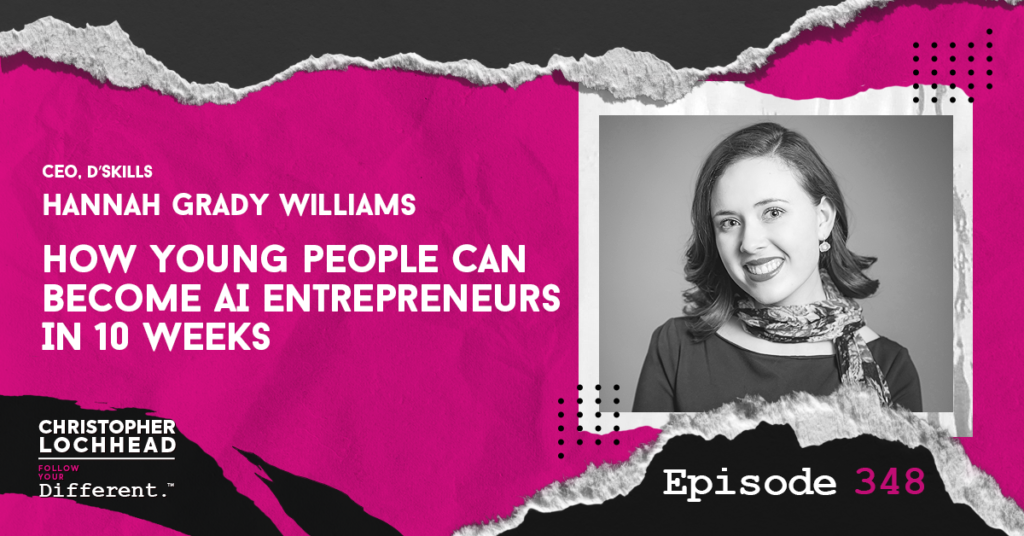
Podcast: Play in new window | Download (Duration: 51:35 — 35.4MB) | Embed
Subscribe: Apple Podcasts | Spotify | Pandora | RSS | More
On this episode of Christopher Lochhead: Follow Your Different, we unveil what’s really possible for young people when they’re set up to win as modern entrepreneurs, leveraging new AI technology. And who better to showcase it than the Gen Z whisperer for CEOs and executives, Hannah Grady Williams.
Hannah Grady Williams is back, and she’s here to talk about d’Skills. d’Skills is a one-of-a-kind digital training community that teaches young people entrepreneurship, AI skills, and how to create a revenue producing business in 10 weeks. And the superstars of this conversation are teenage AI entrepreneurs, Rory Straight and Anna Mitchell, two recent graduates of the d’Skills Program.
This episode will definitely challenge and inspire you to think about what’s possible for young people in new and different ways.
You’re listening to Christopher Lochhead: Follow Your Different. We are the real dialogue podcast for people with a different mind. So get your mind in a different place, and hey ho, let’s go.
Hannah Grady Williams on d’Skills and AI
The conversation starts off with Hannah introducing d’Skills and what they do.
Simply put, d’Skills is a hub where high schoolers are coming to learn 21st century skills and technology like ChatGPT and all its uses, and develop their skills further into projects that can make an impact in the market and the business world.
Hannah finds it fascinating how new technology can bridge the gap between young people’s ideas and the business world, and give birth to new products and categories that they can further develop as they learn more skills, or become more adept in their current ones.
Using AI for Business Projects while still in High School
Hannah also talks about a thing that she and d’Skills did over the summer called GPT Challengers Cup, in which they invited high schoolers from around the globe. And from this competition emerged Rory and Anna, who are also joining us on this episode.
It was astounding what ideas and end products that high schoolers were able to develop in the span of 30 days, but in the end, it was Rory & Anna’s project that emerged victorious.
What they ended up building was a Chrome extension that functions as an app that helps people study more efficiently by creating a comprehensive studying schedule based on the tasks you have registered in your to-do list.
Learning a New Skill in 15 Second or Less
Christopher then talks to Anna, who was handling the social media aspect of their team. This info was made more impressive by the simple fact that Anna has not handle social media marketing prior to the competition, and had to learn things through a bit of mentorship, but also doing a lot of research by herself.
“It’s actually funny that you asked that question because right now, I’m actually in a marketing class. And it’s super funny, because with all due respect to my teacher, I’ve learnt nothing in that class; It is like busy work, papers, everything. It’s crazy how much that I learned even like before the two weeks before the actual cup was over, and now that I’m doing it like in my free time, that it’s really not as hard to make it seem.
You don’t have to know all the business lingo and the economic terms. All you have to do is continue to push yourself and try new things and see what works and if it doesn’t work, then you know that doesn’t work and you move on from that.”
– Anna Mitchell
To hear more from Hannah, Rory, and Anna and the importance of skill-building with new technology in the business world, download and listen to this episode.
Bio
Hannah Grady Williams is the founder/CEO of d’Skills. d’Skills is a one-of-a-kind digital training community that teaches young people entrepreneurship, AI skills and how to create a revenue producing business in 10 weeks.
Aurora Straight
Hi, I’m Aurora, a STEAM enthusiast from Kansas with a deep passion for innovation and a strong presence in both academics and extracurricular activities. I compete in robotics and debate, channel my energy into basketball, and master precision in fencing. My ambition steers me towards aerospace engineering or a career in the Air Force, reflecting my desire to explore and innovate.
I co-founded ‘Acadium,’ a testament to my commitment to enhancing educational experiences through technology. My victory in the GPT Innovators Cup further underscores my ability to leverage AI for creative solutions. With internships at notable organizations under my belt, I’m honing my skills for real-world challenges.
My journey is more than just personal achievement; it’s about pushing the boundaries of what’s possible and inspiring others to do the same.
Anna Mitchell
Hello, I’m Anna, a high school student and digital art enthusiast turned innovator. My journey is marked by the creation of ‘Acadium,’ a Chrome extension that showcases my flair for digital solutions. Winning the GPT Innovators Cup was a milestone that affirmed my passion for AI-driven creativity. I’ve also contributed to our Community Cafe, enhancing our collective experience in the March sprint.
My hands-on approach to learning is evidenced by internships with leading organizations, including Peachtree Training Group, where I’ve applied my skills to real-world challenges. These experiences have not only honed my technical abilities but also fueled my ambition to innovate within the digital art and technology sphere.
Links
Connect with Hannah and d’Skills!
d’Skills | LinkedIn | Twitter/X
We hope you enjoyed this episode of Christopher Lochhead: Follow Your Different™! Christopher loves hearing from his listeners. Feel free to email him, connect on Facebook, Twitter, Instagram, and subscribe on Apple Podcast / Spotify!
347 Bouncing Back: Facing and Conquering Life’s Toughest Challenges with Combat Veteran Travis Mills
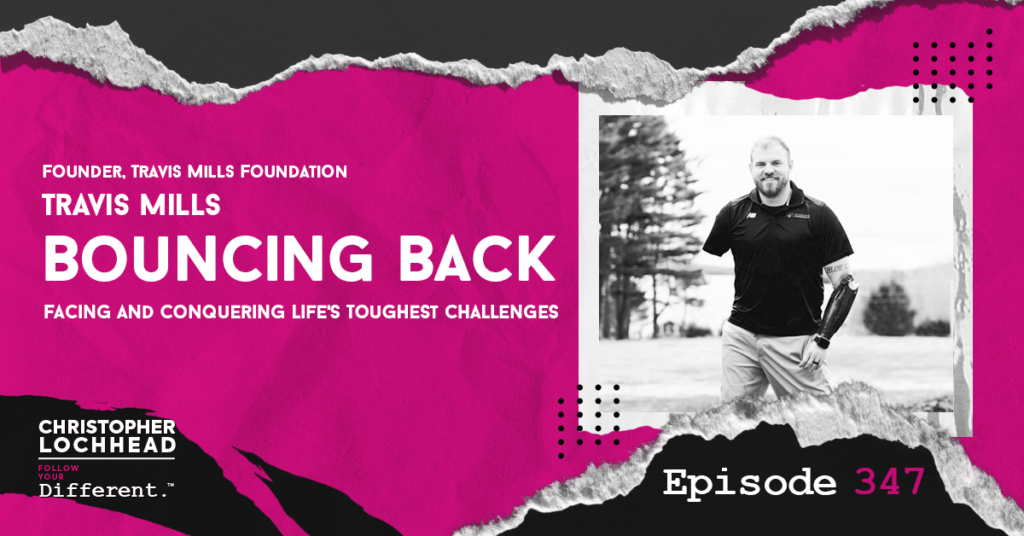
Podcast: Play in new window | Download (Duration: 1:11:35 — 49.2MB) | Embed
Subscribe: Apple Podcasts | Spotify | Pandora | RSS | More
We all encounter radical challenges, and we face big choices about how we approach life in the most challenging moments and learn to survive in – maybe even thrive. Today, we are joined by a combat veteran, retired US Army Staff Sergeant Travis Mills, as he shares his challenges and the choices he has made to get to where he is today.
Travis Mills is a serial entrepreneur, the driving force behind the Travis Mills Foundation, and the author of Bounce Back: A playbook for facing life’s toughest challenges with grace and gusto.
Make sure you listen all the way to the end. You don’t want to miss any of Travis’s unrelenting spirit, wisdom and humor.
You’re listening to Christopher Lochhead: Follow Your Different. We are the real dialogue podcast for people with a different mind. So get your mind in a different place, and hey ho, let’s go.
Travis Mills on his Military Service and Experience
Christopher starts off the conversation by inquiring about Travis’s motivation for joining the military.
Travis recounts feeling directionless after college, and was prompted by family advice to choose a military path for personal growth and benefits. Fascinated by infantry roles, Travis enlisted for a signing bonus.
He breezed through basic training due to his athletic prowess and later engaged in military ground fighting tactics, drawing on his childhood interest in karate. Despite his combat skills, Travis values self-control and notes the discipline instilled by martial arts.
Travis Mills on Mental Toughness
Travis reflects on being featured on a magazine cover for his mental toughness rather than physical appearance. He also appreciates the recognition for his foundation work. Christopher acknowledges the disparity between modeling and true toughness.
Travis also shares instances where he had to assert himself, highlighting his ability to de-escalate conflicts but also assert authority when needed. He explains how his military background balances his jovial persona, noting people’s tendency to underestimate him. He emphasizes the importance of professionalism and corrective measures in his businesses, showcasing his leadership style derived from his military experience.
From Military to Entrepreneurship
Christopher admires Travis’s entrepreneurship and proposes introducing him to Iron Mike Stedman, a fellow Marine and entrepreneur. Stedman’s mission involves helping inner-city kids through boxing and assisting veteran entrepreneurs with their businesses.
Travis expresses his belief in pursuing dreams and betting on oneself, citing personal experiences in entrepreneurship. Despite facing challenges, Travis advocates for seizing opportunities and embracing failure as a motivator. He shares his ventures in house flipping and marina ownership, emphasizing the importance of surrounding oneself with supportive people and taking calculated risks.
Travis’s resilience and clarity of purpose derived from his military background inform his entrepreneurial journey.
To hear more from Travis Mills and his journey and challenges from being in the military to being an entrepreneur, download and listen to this episode.
Bio
Born and raised in Vassar, Michigan, United States Army Staff Sergeant (Ret.) Travis Mills of the 82nd Airborne is a recalibrated veteran, motivational speaker, actor, author and an advocate for veterans and amputees. In addition to being the founder of the Travis Mills Foundation, Travis also serves as the President of the Board of Directors.
Travis has achieved his vision for the Foundation by bringing together a talented array of experts who masterfully accomplish the Foundation’s mission. Per Travis’s lead, the team at the Foundation are not only respected colleagues, they are family.
Links
Connect with Travis Mills!
Travis Mills Foundation | Instagram
We hope you enjoyed this episode of Christopher Lochhead: Follow Your Different™! Christopher loves hearing from his listeners. Feel free to email him, connect on Facebook, Twitter, Instagram, and subscribe on Apple Podcast / Spotify!
346 Dating Over 40 with Nina Jarnum, author of “F*ck Kissing Frogs”
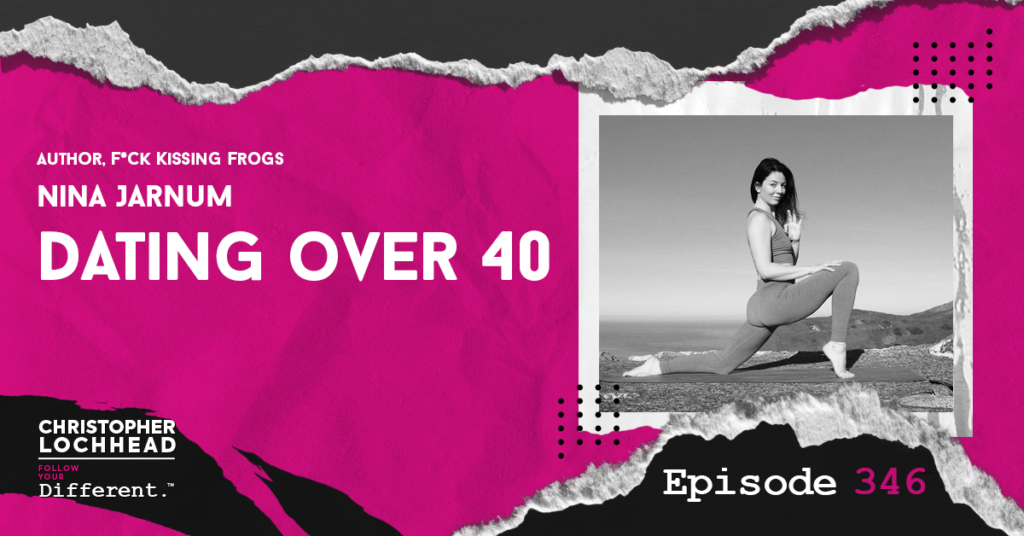
Podcast: Play in new window | Download (Duration: 1:14:30 — 51.2MB) | Embed
Subscribe: Apple Podcasts | Spotify | Pandora | RSS | More
It’s February, so what better time it is than to talk Love on Christopher Lochhead: Follow Your Different. Today, we have a fun one: a special dating episode for people over 40. And who better to talk about it than our guest, Nina Jarnum.
Nina Jarnum is a lawyer-turned-Yogi-turned-popular writer, and she’s the author of a new book called, “F*ck Kissing Frogs”. And we had a blast talking about her book and the topic of dating over 40, as you’ll hear in just a bit.
You’re listening to Christopher Lochhead: Follow Your Different. We are the real dialogue podcast for people with a different mind. So get your mind in a different place, and hey ho, let’s go.
Nina Jarnum on Kissing Frogs
Christopher jumps straight into it with the question of how many frogs do you have to kiss to find the one. Nina answers that if one is being smart about picking and dating, not as much as one would think.
Nina recounts her experiences in online dating, starting off with the bad impressions and stigma that people say online dating has to offer. But for the most part, Nina did not encounter those issues and had fun with online dating; which got her curious why a lot of people had a bad impression of it.
And so Nina asked her friends if she could check out their matches and update their profile, and some got better results from it soon after.
Nina Jarnum’s Online Dating Tips for Women
When asked about what is it that sets up a good profile from a bad one, Nina points out that having a good profile is like introducing yourself favorably to the other person. It’s a good way to share some information that shows what you are looking for in a person, but not so much that you’re sharing your life story.
Another tip that Nina gives is to be mindful of your profile pictures. Aside from the usual things to avoid like hiding in group photos and such, Nina suggests having at least one full-body picture on it, so that people have an idea of who they are meeting, and it’s also a good visual treat.
Nina also talks about avoiding using filters and other image-altering stuff in your profile, as it is a major turn-off for men to find out that they’re not meeting who they think they were supposed to meet based on the profile.
“Don’t put filter on your photos. Every man I have spoken to about this have been like, their pet peeve is turning up on a date and not being able to recognize the person is such a turnoff. I like comparing it to as a woman when you go on a date with a man and his profile says he’s 6’5”, and he turns up and he’s 5’7”. It’s not cool.”
– Nina Jarnum
Nina Jarnum on Dating Preferences and Honesty
Following that line of thought, Nina adds that not only is it an awkward encounter at the very beginning of the date, it sets a bad impression and precedent right from the start that you are lying about something. She explains that while trying to appeal to the general consensus of what a “good-looking” guy or gal sounds seems like the way to go, the whole point of online dating is to find someone that likes you that you might also like, and not the other way around.
That said, there will always be preferences on people that you like, but Nina suggests that you don’t overly limit yourself to those preferences, because you might be missing out. One common thing that she points out is about people’s height; as some would not even consider dating someone who is below a certain number.
The point is, sampling out of your comfort zone is fine once in a while, especially if your current pool is not turning out the results that you want. You might end up finding that great date from someone you didn’t expect.
To hear more from Nina Jarnum and more dating tips for people over 40, download and listen to this episode.
Bio
Nina Jarnum is a mother, a lover and a world explorer. She was born and raised in Denmark, moved to England in her twenties where she graduated law school.
Nina has taught yoga, breath work and mindfulness all over the world, has written for major fitness magazines and worked with “Start Today” for the Today Show. She uses her knowledge and experience as mindfulness teacher to help people on a conscious journey of healthy dating.
Nina believes that authenticity, self-care, a willingness to be uncomfortable and most of all gratitude is the secret to not just finding love but also a happy life.
Links
Connect with Nina Jarnum!
Instagram | Twitter / X | F*ck Kissing Frogs
We hope you enjoyed this episode of Christopher Lochhead: Follow Your Different™! Christopher loves hearing from his listeners. Feel free to email him, connect on Facebook, Twitter, Instagram, and subscribe on Apple Podcast / Spotify!
345 Learned Excellence: Legendary Lessons from Navy SEALs, CEOs, Pro Athletes & Big Wave Surfers with Dr. Eric Potterat & Alan Eagle
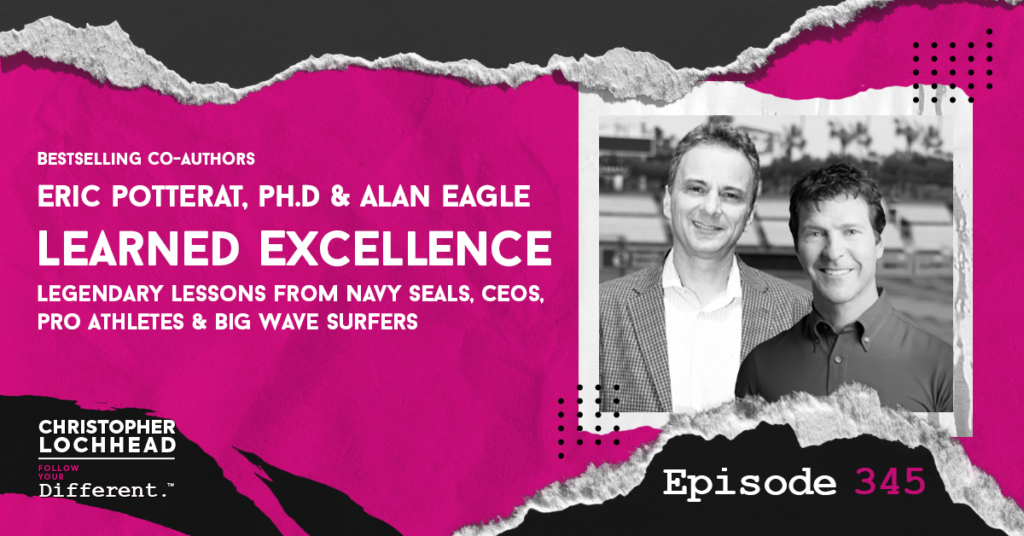
Podcast: Play in new window | Download (Duration: 1:31:00 — 62.5MB) | Embed
Subscribe: Apple Podcasts | Spotify | Pandora | RSS | More
This episode is exclusively for people who want to have a personal breakthrough in their own performance. And who better to discuss it with but with people who have learned excellence, Dr. Eric Potterat & Alan Eagle.
Alan Eagle is an executive Communication Coach, and he spent 16 years working with a top people at Google. He’s written several other books, and his most well-known for his celebrated book, “Trillion Dollar Coach” about the legendary Silicon Valley coach Bill Campbell.
Dr. Eric Potterat is a clinical and performance psychologist, and he was with the US Navy for over 20 years as a commander. On the last 10 years of Eric’s career. he was the head psychologist for the US Navy SEALs globally.
To say that these two know a little bit about how the top performers in the world do what they do is a radical understatement. And on this episode, we get into all of it, we pop the hood to go deep on their new book learned Excellence, which I highly recommend you pick up a copy of.
You’re listening to Christopher Lochhead: Follow Your Different. We are the real dialogue podcast for people with a different mind. So get your mind in a different place, and hey ho, let’s go.
Dr. Eric Potterat and Alan Eagle on Maintaining One’s Mental Health in a Chaotic World
Christopher, Alan and Dr. Eric opens the discussion on how they maintain their mental health with all the crazy things happening around all of us.
Christopher highlights the overwhelming challenges globally, from political divisiveness to wars and rising anti-Semitism. Dr. Eric emphasizes the importance of focusing on what individuals can control, citing attitude, effort, and behavior within their circle. Alan adds that staying informed is crucial, but he discourages excessive complaining, urging people to think about actionable steps rather than mere criticism.
“I can’t stand the complainers. Okay, if you’re going to take a position, great! Then I would think through, “what can you do?””
– Alan Eagle
The three then get into how the struggle of balancing engagement with the world and avoiding emotional overload, especially in the face of potentially troubling events in the upcoming years.
Dr. Eric Potterat and Alan Eagle on Mindset, Organizational Culture, and Sustained Excellence in Baseball
Christopher, Alan, and Dr. Eric then talk about maintaining a good mindset in spite of challenges along the way.
Dr. Eric talks about the concept of agency, and how to distinguish between victims, survivors, and thrivers, advocating for the latter by practicing agency and embracing post-traumatic growth.
Alan underscores the importance of choosing a mindset and shares his experience with the Dodgers, highlighting the team’s systemic approach and organizational mindset. Dr. Eric credits the Dodgers’ sustained excellence to a focus on hiring talented individuals, providing necessary tools, and maintaining a process-oriented approach.
Process and Mental Toughness in Entrepreneurship
They then discuss the crucial role of process and mental toughness in entrepreneurship. Christopher draws from Michael Gerber’s “The E Myth,” highlighting how successful franchises attribute their triumph to well-defined processes, contrasting with small businesses’ failure due to a lack of systematic approaches.
Dr. Eric identifies process as a pillar of mental toughness, emphasizing its role among the five pillars discussed in their book.
Alan Eagle also shares insights from Silicon Valley, underscoring the balance between process and visionary chaos at Google, which contributed to its innovative success.
To hear more from Dr. Eric Potterat and Alan Eagle on how to learn excellence, download and listen to this episode.
Bio
Eric Potterat, PhD, is a clinical and performance psychologist and a leading expert in individual and organizational performance optimization. He retired as a commander from the US Navy after twenty years of service, during which he helped create the mental toughness curriculum used during Navy SEALs BUD/S training.
Dr. Eric spent several years as the director of specialized performance for the Los Angeles Dodgers and has also worked with Red Bull athletes, the US Women’s national soccer team, the Miami Heat, and numerous Olympic athletes, first responders, business leaders, and NASA astronauts.
Alan Eagle is an author and executive communications consultant, helping leaders and companies shape and tell their stories. He spent 16 years at Google, partnering with executives to communicate the company’s story to clients, partners, employees, and the public.
Alan is the co-author of the books How Google Works and Trillion Dollar Coach, and the author, all by himself, of seven letters-to-the-editor published in Sports Illustrated. He has never won the New Yorker Caption Contest.
Links
Connect with Dr. Eric Potterat & Alan Eagle!
Dr. Eric LinkedIn | Alan LinkedIn | Learned Excellence
We hope you enjoyed this episode of Christopher Lochhead: Follow Your Different™! Christopher loves hearing from his listeners. Feel free to email him, connect on Facebook, Twitter, Instagram, and subscribe on iTunes!
344 Product, Growth, and Career Advice with Lenny Rachitsky
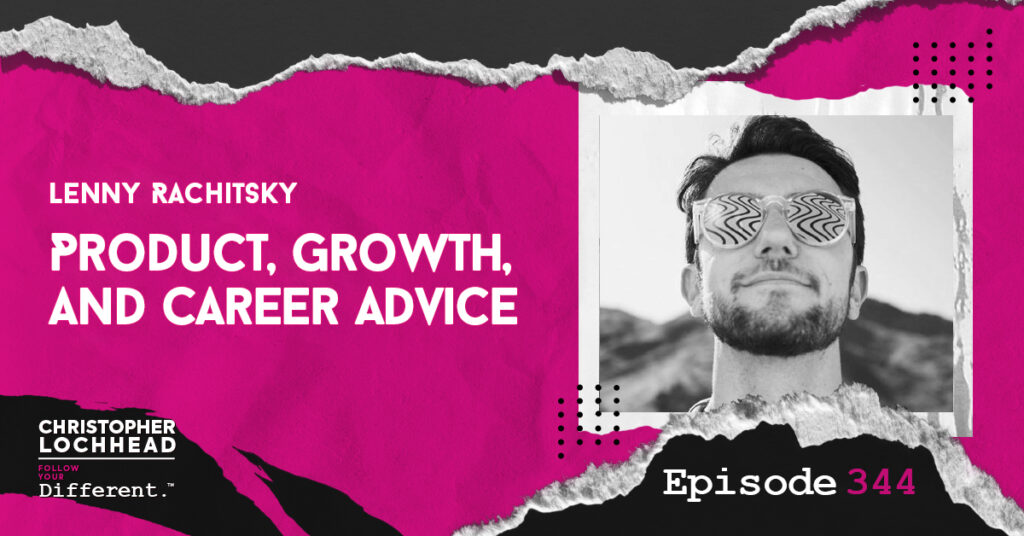
Podcast: Play in new window | Download (Duration: 1:03:41 — 43.7MB) | Embed
Subscribe: Apple Podcasts | Spotify | Pandora | RSS | More
On this episode of Christopher Lochhead: Follow Your Different, we are joined by one of my favorite people in the creator world, Lenny Rachitsky. A few episodes back, we posted the conversation we had on Lenny’s Podcast were I also extended an invite to him for a dialogue at Follow Your Different. And now, here we are.
Lenny Rachitsky specializes in deeply researched product growth and career advice, particularly for those in the startup/tech world. Lenny’s newsletter on Substack is also the number one paid business Substack. Try as we might with Category Pirates, we’ve been unable to catch him, and I think that’s great.
There are some powerful learnings here for marketers, and creators, and really anybody who wants to design a legendary career, I think you’re going to absolutely love this very special conversation with Lenny.
You’re listening to Christopher Lochhead: Follow Your Different. We are the real dialogue podcast for people with a different mind. So get your mind in a different place, and hey ho, let’s go.
Lenny Rachitsky on Product Management and Growth Strategies
The conversation begins with Christopher praising Lenny’s approach to product management and growth, hailing him as the “category King.” They then discuss the value of staying broad versus niche in product management, with Lenny expressing admiration for specific experts like Emily Kramer in marketing.
Christopher commends Lenny for his unique, non-egotistical approach in a field filled with “hustle porn stars.” Lenny attributes his success to providing genuine value rather than chasing followers. Christopher perceives a cohesive through line in Lenny’s work, suggesting a continuous quest to answer key questions for founders and product builders.
Lenny elaborates on his goal of addressing a broad range of questions in product management and growth, emphasizing a core focus with intersecting adjacencies like career and leadership.
Creating Valuable Content through Practical Application of Ideas
Lenny continues to discuss his approach on content creation, emphasizing the importance of maintaining diverse interests to keep himself engaged. Christopher Lochhead praises Lenny for incorporating varied topics into his work, appealing to a broader audience beyond the core niche of product management.
From there, they explore the concept of obvious and non-obvious content, with Lenny acknowledging the practical nature of his content. Christopher notes the challenge of balancing obviousness with depth, expressing his preference for content that goes beyond the blatantly evident. Despite categorizing Lenny’s content as somewhat obvious, Christopher commends him for avoiding the realm of “stupid obvious,” recognizing the valuable and practical applications within Lenny’s work.
Lenny Rachitsky on Creating Quality Content
Following up on this, Christopher questions Lenny Rachitsky on creating smart, obvious, and practical content without it being overly simplistic.
Lenny attributes his success to maintaining a high bar for quality, ensuring content is not overly obvious or uninteresting. He emphasizes spending extensive time on each post, sometimes up to 100 hours, and credits his ability to dedicate full time to content creation as a significant advantage.
Lenny describes a flywheel effect where initial success allows more time for improvement, creating a cycle of growth. He suggests that anyone can follow this model if they find the time and opportunities to invest in their content.
To hear more from Lenny and his ideas and thoughts on business content creation, download and listen to this episode.
Bio
Lenny Rachitsky (author of #1 business newsletter on Substack with 500k+ subscribers) interviews world-class product leaders and growth experts to uncover concrete, actionable, and tactical advice to help you build, launch, and grow your own product.
Links
Connect with Lenny Rachitsky!
Lenny’s Website | Lenny’s Podcast | Twitter/X | LinkedIn
We hope you enjoyed this episode of Christopher Lochhead: Follow Your Different™! Christopher loves hearing from his listeners. Feel free to email him, connect on Facebook, Twitter, Instagram, and subscribe on iTunes!
343 Miracle Morning / Miracle Life with Hal Elrod, multi-million bestselling author
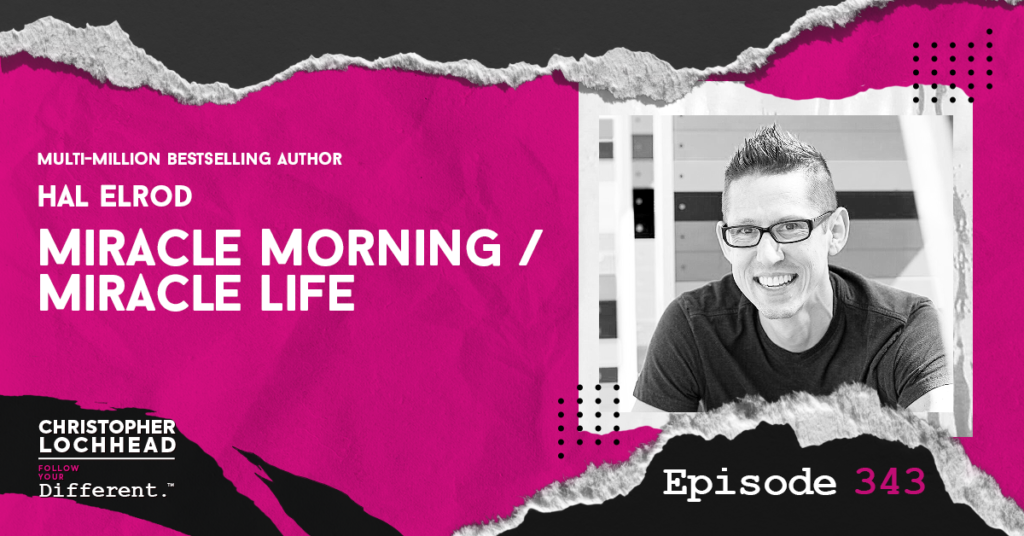
Podcast: Play in new window | Download (Duration: 1:06:34 — 45.7MB) | Embed
Subscribe: Apple Podcasts | Spotify | Pandora | RSS | More
It is now 2024; and as they say, a new year, a new you. So let us start you off by helping you gain a new lens and perspective on things. And who better to assist you on that than our guest, Hal Elrod.
In the world of kind of personal growth and personal development, Hal Elrod stands alone. He’s recently released a new updated and expanded version of the Miracle Morning. To say that Hal Elrod has created a movement would be putting it mildly.
On this episode, you get to enjoy an extraordinary conversation with this man.
You’re listening to Christopher Lochhead: Follow Your Different. We are the real dialogue podcast for people with a different mind. So get your mind in a different place, and hey ho, let’s go.
Hal Elrod on Spirituality and Personal Growth after Traumatic Events
Hal Elrod talks about his journey of overcoming cancer and the cognitive challenges caused by chemotherapy. He shares that he has found himself struggling to finish books because he takes longer to process and comprehend what he was reading, or he forgets what has happened one or two chapters before and ends up rereading them again.
They then delve into Hal’s spiritual growth post-trauma, exploring his Catholic upbringing and exploration of various religions. Hal emphasizes an inclusive perspective, viewing different faiths as attempts to understand a higher power. He describes a personal and intimate relationship with God, finding solace and strength through prayer.
Hal reflects on the usefulness of belief and shares instances where prayer manifested specific outcomes, reinforcing his faith in a higher power.
Hal Elrod on Faith, Personal Development, and Empathy in a Broken World
When asked, Hal Elrod acknowledges his connection to Christianity but emphasizes a nuanced belief, focusing on embodying Jesus Christ’s teachings rather than subscribing blindly.
Christopher appreciates the authenticity of Hal’s answer, asserting that being a good person matters more than religious labels. Christopher shares a personal perspective on faith, stating that being a good person transcends religious affiliations. He mentions a song by Aaron Lewis that explores everyone talking to God in challenging times, highlighting the universal inclination towards faith during hardships.
This reflects a shared belief in the importance of personal development and empathy over rigid religious definitions in navigating life’s challenges.
Miracle Mornings & Focusing on Personal Growth during Uncertain Times
Christopher praises Hal Elrod’s impactful work on personal development, particularly the Miracle Morning routine. He notes the challenging times, referencing global issues, economic struggles, and personal hardships.
Hal shares some of his insights from 2020, emphasizing the importance of focusing on what’s within one’s control to maintain mental well-being. He highlights the Miracle Morning as a powerful tool for daily self-improvement and resilience, especially during chaotic periods.
Hal underscores the correlation between feeling out of control and the necessity of self-care. Ultimately, he advocates for concentrating on personal growth, stating that inner peace contributes to a better world, emphasizing the responsibility individuals have to themselves and those around them in tumultuous times.
To hear more from Hal Elrod and how to live have your own Miracle Mornings, download and listen to this episode.
Bio
Hal Elrod is on a mission to Elevate the Consciousness of Humanity, One Person at a Time. As the author of one of the highest rated books on Amazon, “The Miracle Morning” (which has been translated into 37 languages, has over 3,000 five-star reviews and has impacted the lives of over 2,000,000 people in more than 70 countries) … he is doing exactly that.
What’s incredible is that Hal literally died at age 20. His car was hit head-on by a drunk driver at 70 miles per hour, his heart stopped beating for 6 minutes, he broke 11 bones and woke up after being in a coma for 6 days to be told by his doctors that he would probably never walk again.
Not only did Hal walk, he ran a 52-mile ultra-marathon and went on to became a hall of fame business achiever, international keynote speaker, author, and grateful husband & father-all before he turned 30.
Then, in November of 2016, Hal nearly died again – his kidneys, lungs, and heart were failing, and he was diagnosed with a rare, and very aggressive form of cancer and given a 30% chance of living.
After enduring the most difficult year of his life, Hal is now cancer-free and furthering his mission as the founder of The Miracle Morning book series, host of the “Achieve Your Goals” podcast, creator of the Best Year Ever [Blueprint] LIVE event, and Executive Producer of The Miracle Morning MOVIE – a documentary that reveals the morning rituals of some of the world’s most successful people.
Hal is grateful to be alive and living his mission alongside his wife and their two young children in Austin, TX.
To contact Hal about media appearances, speaking at your event, or if you just want to receive free training videos and resources, visit www.HalElrod.com.
Links
Connect with Hal Elrod!
Hal’s website | Miracle Morning
We hope you enjoyed this episode of Christopher Lochhead: Follow Your Different™! Christopher loves hearing from his listeners. Feel free to email him, connect on Facebook, Twitter, Instagram, and subscribe on iTunes!
342 One Woman’s October 7th Bravery At The Nova Festival Massacre In Israel with Natalie Sanandaji
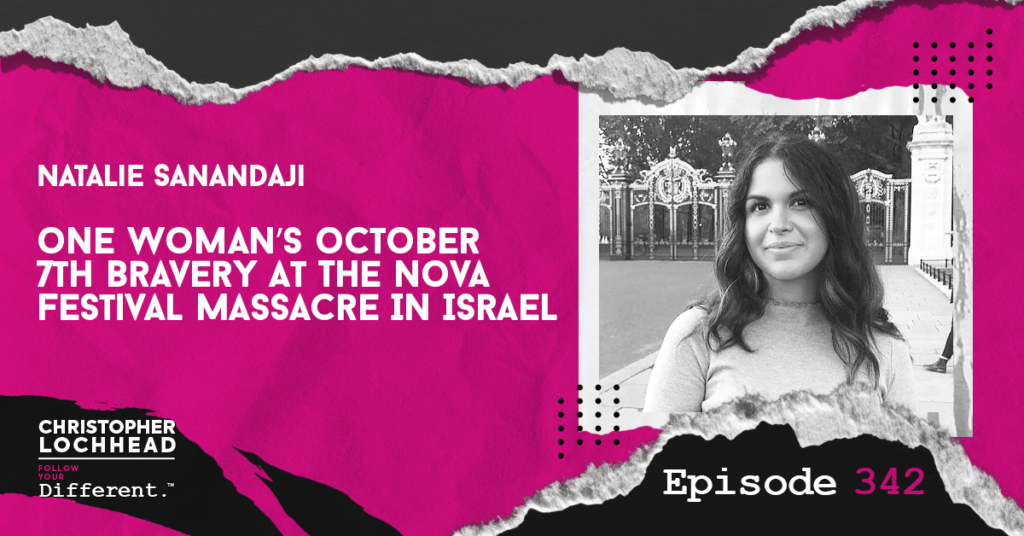
Podcast: Play in new window | Download (Duration: 1:17:11 — 53.0MB) | Embed
Subscribe: Apple Podcasts | Spotify | Pandora | RSS | More
Today marks the 100th day from the terrorist attack done by Hamas that took the lives of many civilians in Gaza. On this episode, our guest is an extraordinary woman named Natalie Sanandaji, who shares her experience as it happened on what could be described as the worse day for Jews since World War II.
What you’re about to hear is a real, unedited, unfettered, unfiltered conversation about an extraordinary event that happened on October 7, and has been impacting the rest of the world since.
You’re listening to Christopher Lochhead: Follow Your Different. We are the real dialogue podcast for people with a different mind. So get your mind in a different place, and hey ho, let’s go.
Natalie Sanandaji on the Day of the Attack
The conversation starts off with Natalie painting a scene on how she found herself in the middle of the October 7th terrorist attack, where Hamas militants killed civilians and held the population hostage.
For context, Natalie is an American-Persian Jew, who visits her relatives frequently, especially during holidays and family celebrations. As such, her visit back in October was for vacation, so she could be with them in the upcoming holiday season.
That said, she had heard that there was an upcoming Nova Music Festival nearby, wherein they can camp out and enjoy music, which often lasted for a few days. The immediate comparison is that it was like Woodstock, as the themes of peace with music was similar.
The irony of the event and what happened afterwards did not escape Natalie.
Natalie Sanandaji on the Start of the Attack
After the first night of the festival was over, Natalie and her friends decided to go back to their campsite and take a nap until the morning set of the festival. But instead of waking up to the sound of music, they were woken up by the sound of rockets.
“One of our friends from our campsite was on the dance floor when the rock first rockets were intercepted overhead, and she knew that we were still at the campsite sleeping; we hadn’t woken up yet. So she came back to the campsite to wake us up, because she wants to make sure that we were alert to what was happening. She came in she woke us up and she was all smile-y. And she was like, “Hey guys, good morning. I just want to wanted you to know a few rockets were intercepted overhead. But it’s fine.” “
– Natalie Sanandaji
Normally, the Iron Dome would’ve intercepted the few rockets and everything would be back to what they were, with their biggest fear being getting hit by falling debris. But there was something to the amount and frequency of the rockets that made Natalie’s friend think that this was different.
Escalation
After hearing more than a dozen rocket explosions, Natalie and her friends decided to pack up and just go home. Party’s over. Though there were people who were starting to panic as they were going to their cars, the whole vibe of it was more annoyance than fear – annoyed that the festival was cut short because of what was happening.
Natalie and here friends themselves were not in a hurry. She even found time to go to the bathroom to freshen up while her friends waited by the car. Only later did Natalie find out that that decision could’ve been a fatal mistake on her part.
“I went to the bathrooms and then I went back to the car, and not until about two weeks later did I realize how much I was putting my life in danger by going to those bathrooms. Because about two weeks later was when a video surfaced of the Hamas terrorists coming to those exact bathrooms where I was maybe 10-15 minutes later, and just shooting at every bathroom stall trying to kill anyone who was hiding inside.”
– Natalie Sanandaji
As they drove out of the venue, the festival security was herding the leaving people into the dirt roads for better traffic. Though suddenly, those same security people started telling people to go back, and later on telling them to get out of their cars so they could run and hide. Only then did people know that something was horribly wrong.
And then, the sound of gunshots started to get louder and closer.
To hear more from Natalie Sanandaji and her account on what happened on that fateful day, download and listen to this episode.
Bio
Natalie Sanandaji, 28, serves as a public affairs officer for the Combat Antisemitism Movement (CAM).
A Long Island native, Natalie worked in real estate in New York City before October 7th, when she survived the Nova music festival massacre during a visit to Israel. Her traumatic experience that day led her to transform her life and switch her professional track to Jewish advocacy and fighting antisemitism.
Links
Connect with Natalie Sanandaji!
Combat Antisemitism Movement | CAM Twitter/X
We hope you enjoyed this episode of Christopher Lochhead: Follow Your Different™! Christopher loves hearing from his listeners. Feel free to email him, connect on Facebook, Twitter, Instagram, and subscribe on iTunes!
340 2024: DEI, AI, The Cloud & Beyond with Bob Evans & John Siefert of Acceleration Economy
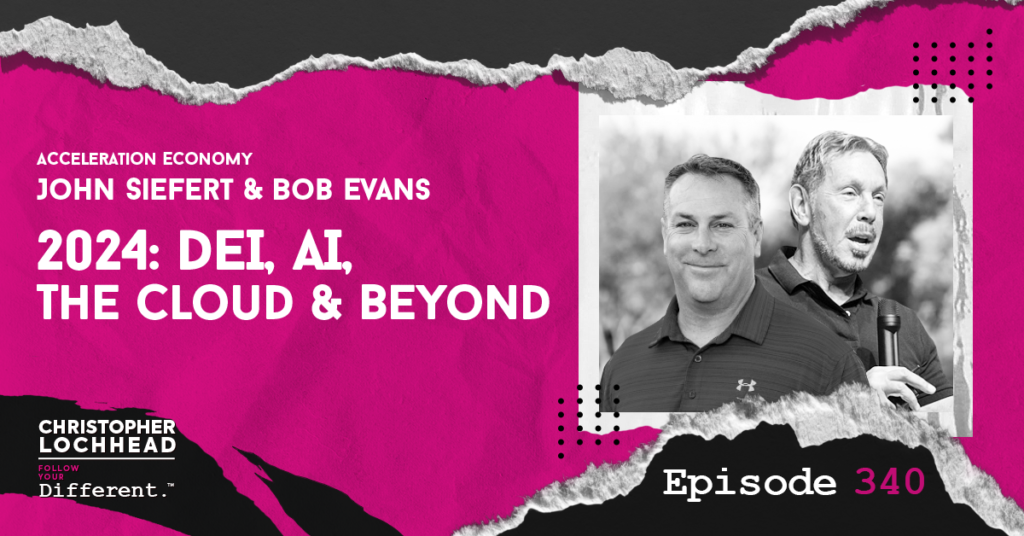
Podcast: Play in new window | Download (Duration: 1:11:56 — 49.4MB) | Embed
Subscribe: Apple Podcasts | Spotify | Pandora | RSS | More
Today on Christopher Lochhead: Follow Your Different, John Siefert and Bob Evans, the leaders and founders of Acceleration Economy, join in on the dialogue about DEI, AI, and what’s in store for 2024.
In addition, Bob Evans is also the host of the podcast called Cloud Wars Live, which Christopher has actually been a guest to a few times. They also have some great guests and amazing discussions over there, so go check them out after this episode.
That said, let’s dive in into this dialogue and prepare ourselves for the upcoming year.
You’re listening to Christopher Lochhead: Follow Your Different. We are the real dialogue podcast for people with a different mind. So get your mind in a different place, and hey ho, let’s go.
John Siefert on DEI in Tech Industry
The discussion opens up on the topic of what they have learned in the past year. One thing they agreed on immediately is that people seem to have gotten a little dumber in 2023. Not like major blunders and the like, but more like small things that might seem inconsequential at first, and came back to bite them before the year’s end.
After this brief exchange, the topic shifts to the topic of morals and intellectual decay that they have observed in the tech industry, particularly in the implementation of DEI statutes and the like. John Siefert comments on DEI, more specifically how a well-intentioned thing on paper could become twisted and be exploited when applied in the current social landscape.
An example in the discussion is that people are being told to hire a diverse staff not because of being inclusive, but rather to meet certain numbers and get benefits out of it. Given these circumstances seemingly are the norm nowadays, Christopher believes that the floodgates might open once this one particular case sets precedence.
Bob Evans on how DEI is distorted in practice
Bob adds to the topic of DEI and points out that the distortion often comes on how it was implemented, e.g. if it’s already done in bad faith from people up in management for a few people’s benefit, then the struggle to actually implement a proper setup will be that much harder.
It has come to the point that Inclusion is being used to actually exclude people. The example that the group gives is that certain analysts believe that Asians are overrepresented in Tech. So rather than hiring someone that is very capable in the required position, companies end up not opting to hire such talent because the person is Asian, and therefore skew their DEI scores. They would end up hiring for diversity rather than skill, and this dilutes their products and services, causing overall loss in the long run.
The point of DEI was to be fair and impartial, and yet in practice it just became a way to fulfill certain requirements for special perks, sometimes to the detriment of the company.
To hear more about Bob Evans’ and John Siefert’s thoughts on DEI, AI, and what 2024 has in store for us, download and listen to the episode.
Bio
John Siefert
Chief Executive Officer, Acceleration Economy Co-founder
John is a strategic thinker and business builder who loves to reimagine what is possible with smart people who are not afraid of the future. He has the ability to visualize voids in the market and then define a people, product, process, and position approach to creating a brand where that void once existed.
Bob Evans
Cloud Wars Founder, Acceleration Economy Co-founder, Analyst
Bob analyzes business innovation, cloud technology, leadership, corporate strategy, and the global digital economy. He’s the founder of Cloud Wars, was recruited by and worked for Larry Ellison, and shares his thinking via daily videos, daily articles, newsletters, and podcasts.
Links
Connect with John Siefert and Bob Evans!
Acceleration Economy Network | Cloud Wars Live: Apple Podcast & Spotify
Bob’s LinkedIn | John’s LinkedIn
We hope you enjoyed this episode of Christopher Lochhead: Follow Your Different™! Christopher loves hearing from his listeners. Feel free to email him, connect on Facebook, Twitter, Instagram, and subscribe on iTunes!

